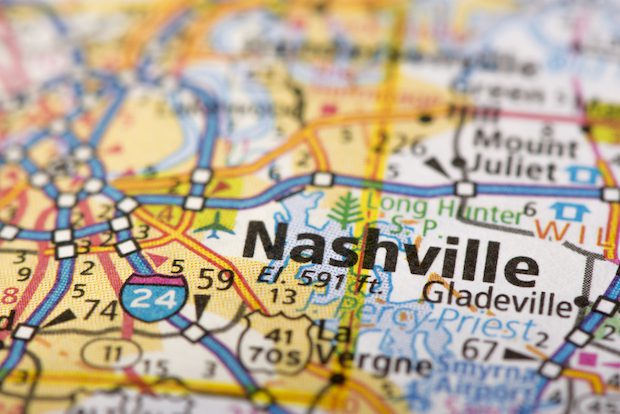Why Tennessee Is ‘Undemocratic’
If local politics have become unbearable, it is because they have mimicked Washington, D.C.

As a native Tennessean, I was amused to learn this week that my home state is “undemocratic.” The Atlantic writer Anne Applebaum derided the Volunteer State in a recent article for being governed by Republicans, and for said Republicans disagreeing with one another (and with a vocal minority of Democrats and left-wing activists) over how best to govern the state.
Tennessee is, as Applebaum’s own reporting demonstrated, a place that is more often excessively democratic than otherwise: What else could explain the numerous factions she describes, which are not only tolerated but even powerful? Tennessee is also a place that, among the southern states, retains some of the fewest resemblances to a Southern aristocracy.
But standards like classical definitions and historical context are not those by which we measure “democracy” in 2023. Democracy now means, to those who use the word most vehemently, that every special interest group must be represented, at all times, and in all places. By this definition, Tennessee is heartily undemocratic. It is, after all, overwhelmingly Republican.
Nevertheless, the Atlantic did deliver one criticism fairly, that of the repeated quote from Nashville’s mayor, that “all politics is national”—or at least they are treated as such in Tennessee, he says. This line is intended to be a mic drop moment, but in 2023 it strikes the reader as merely true, if unfortunate.
The only time local politics seem to matter to American voters today is when they are told such and such school board member, or mayor, or state senator will affect national politics. Meanwhile, those who dream of idyllic localism too often find their city council is not only just as petty as the Washington, D.C., swamp, but petty in the same ways. The mayor is using the same talking points as a U.S. senator because they both got them from the same national cable network or digital media outlet.
It is a phenomenon which is not unique to Tennessee, and it has an escalatory effect: Once one side has used even the smallest tools as hammers, the other side is left either to fight for access to the hammers or to become a nail. Or, to use an example from Tennessee, when an activist moves from California and creates a network of local political “news” websites with the intent of radicalizing the local population against friends and neighbors, it does no one any good to pretend a national strategy is not afoot.
In some ways, such nationalization of local politics has meant Americans are more interested in their local elections than before. This is a silver lining for those who wish to see it. But it also means that, where previously debates were particular to a man’s locale, today every man is having the same squabble, and lately, he is having them over the fence around his backyard, not merely with strangers online.
There are a number of reasons for this, of course, from globalism to mass media. But preceding these changes is a cause which is neither new nor unique to the United States. It is the story of the power and influence of small towns being devoured by an overgrown central government.
Alexis de Tocqueville described this phenomenon in The Ancien Regime and the French Revolution, his text on the political changes in France which led to her bloodiest episode. As the government in Paris grew in size and influence, Tocqueville wrote that Frenchmen with any money purchased a small title and raced to the capital city to distinguish themselves.
The French rightly saw Paris as the most direct pathway to power and success. The countryside, meanwhile, was left to the poorest and the least capable of governing. As a result, Tocqueville wrote, “local liberties disappeared everywhere. Everywhere signs of independent life vanished. The distinguishing features of the various provinces grew faint. This was not because the nation had sunk into torpor, however. On the contrary, movement was apparent everywhere, but now the only motor behind it all was to be found in Paris.”
Tocqueville quotes the French economist Victor Riqueti, the Marquis de Mirabeau, who wrote of the brain drain that would result from such an arrangement:
What will happen, then, if the provinces are reduced to a kind of direct dependency, and provincials are somehow regarded as mere second-class subjects, if they are left with no means to gain recognition and no careers open to ambition, so that all men of any talent are lured to the capital?
Subscribe Today
Get daily emails in your inbox
Rather than governing according to their local needs, the local politicians instead began to mimic the behavior of their national leaders, Tocqueville writes. In other words, they abandoned their local duties, which had value but no appearance of it, for the political charades which, while empty, appeared more important.
We see precisely the same effect today, when state politicians weigh in on foreign wars that can have no relevant connection to their elected positions. We see it when the Mayor of Nashville, John Cooper, is jet-lagged from state-sponsored visits to Kurdistan, which are, apparently, necessary to cultivate Nashville’s large Kurdish population. When the mayor of a mid-sized city is masquerading as a State Department official, it is only reasonable to conclude that the real duties of his job have become of secondary importance.
Tocqueville’s derision of centralization is not an aspersion on central governments themselves, but rather on those which are purely democratic—those in which each citizen is more directly related to the central government than he is to his fellow citizens. Which is to say that if Tennessee’s local politics have become unbearable, and if other states’ local politics have as well, it is due to an excess of democracy, not a lack of it.